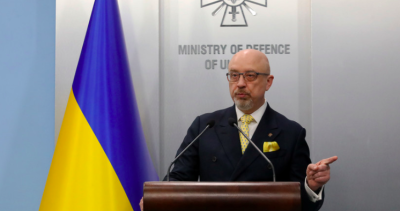Ukrainian Minister: Inappropriate to Say “Russian Invasion” Is About to Happen

All Global Research articles can be read in 51 languages by activating the “Translate Website” drop down menu on the top banner of our home page (Desktop version).
To receive Global Research’s Daily Newsletter (selected articles), click here.
Visit and follow us on Instagram at @globalresearch_crg.
***
An interesting event occurred during this third weekend of February. The Ukrainian defense minister said that it is not appropriate to talk about an immediate Russian invasion, contrary to much of the hegemonic discourse in the Western media. In fact, as time goes on, it becomes more difficult to endorse the anti-Russian narrative that Moscow is preparing to start a war at any moment, which leads officials to look for other arguments in order to justify their measures.
During a speech, Defense Minister of Ukraine, Oleksiy Reznikov, commented on Sunday, February 20, that he does not consider it appropriate to say that a Russian invasion is about to happen these days, as Washington has been saying in recent weeks. These were some of his words:
“Today, as of this hour, Russia has not formed yet a strike force in any city where it surrounded Ukraine. Therefore, it is inappropriate, in my opinion, to talk about the attack tomorrow or the day after tomorrow. But this does not mean that the risks are low, and it does not mean that there is no threat. I want to remind our partners that the threat has existed since 2013”.
On the same occasion, Reznikov stated that his country is “ready” to face any kind of confrontation with Russian troops, which is undoubtedly just a way to alleviate the collective fear in public opinion, considering the huge difference in military power between both countries. In the midst of the recent increase in Ukrainian tensions, the possibility of a new war has given rise to fear, mistrust, and polarization, which has become a real problem within the Ukrainian society itself. In this sense, the minister’s words can be interpreted as an attempt to appease society, both affirming that the risks of invasion are lower than they “seemed” so far, and affirming that Kiev is prepared for this type of confrontation.
It is interesting to note how the words of the Ukrainian defense minister do not in any way represent a break with Western discourse – there is only an attempt to make it more believable, despite apparent contradictions. Recent pronouncements by NATO and US government officials about the “imminence” of a Russian invasion have undoubtedly compelled international society and especially the Ukrainian people into an atmosphere of fear, but this effect is temporary.
With the absence of any invasion, it was expected that in the medium term the fear would end, and public opinion would begin to see inconsistencies in the Western discourse, which could generate a wave of opposition to the anti-Russian measures. In this sense, Reznikov tried to reach a rhetorical middle ground: the invasion plan exists, but it is not for now. In a way, his words contradict the speech of the main western leaders, but at the same time, make the narrative about the invasion plan more “feasible”.
On the same day, the Russian ambassador to the US, Anatoly Antonov, stated during an interview with US media that there is no threat of war. The diplomat emphasized that Russian troops are stationed within Russia’s own sovereign territory, keeping their distance from the autonomous republics, despite recent incursions by Kiev. Antonov explained that Moscow does not claim sovereignty over the Donbass, so there is no possibility of military intervention in the region: “We are not trying to seize any territory of another country. I would like to confirm that Donetsk and Lugansk are part of Ukraine”.
The recent attacks on Donetsk and Lugansk bring even more tensions to the Ukrainian situation as a whole. Kiev is trying to provoke a Russian reaction in Donbass, but Moscow, despite being concerned about the humanitarian situation of the Russian-speaking population, refuses to act in an invasive way, as it recognizes Ukrainian sovereignty over the autonomous republics. The Russian government continues to maintain its strategy of peaceful and legal resolution, calling for Kiev to comply with international agreements and to be punished for the crimes against human rights that are being committed, without, however, considering any form of military intervention.
In the end, the Russian diplomat’s words seem more credible than the Ukrainian minister’s: this is not a long-term invasion plan – simply, there is no such a plan. Once again, public opinion will be maneuvered and a new fallacious discourse will be spread, but this does not change the fact that there is no future for this narrative. At some point, it will no longer be possible to use the argument of the “invasion” that never occurs.
*
Note to readers: Please click the share buttons above or below. Follow us on Instagram, @globalresearch_crg. Forward this article to your email lists. Crosspost on your blog site, internet forums. etc.
Lucas Leiroz is a researcher in Social Sciences at the Rural Federal University of Rio de Janeiro; geopolitical consultant.
Featured image is from rt.com

